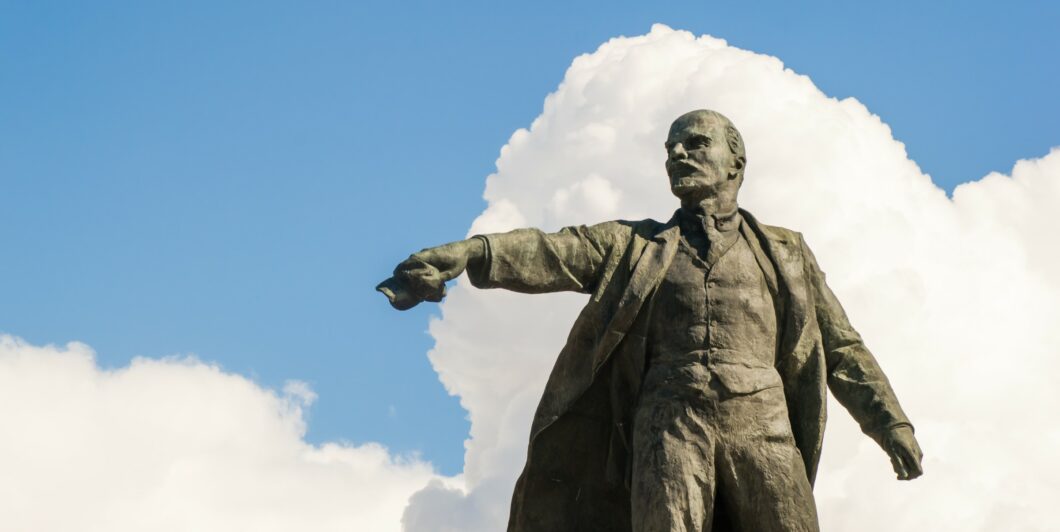Scent of a Woman presents the moral and manly education of Charlie Simms, who has been left fatherless by America.
Lenin’s Legacy
Sunday, January 21, 2024, was a day of celebration for the committed Left online and within higher education. Many Communists across the world marched, gave speeches, and mourned the passing of the founder of one of the world’s most brutal regimes. Vladimir Ilyich Ulyanov, better known by his revolutionary pseudonym V. I. Lenin, died on January 21, 1924, having constructed a tyrannical socialist regime built on the initial desires of the Russian peasantry for “peace, bread, and land.” At a time when many Russians faced civil war and famine, Lenin promised to alleviate their suffering and envisioned a better, more equitable government.
Lenin’s Union of Soviet Socialist Republics (USSR) doggedly pursued the mythical transition from capitalism to communism with a series of forced industrialization and collectivization programs. These transitions were understood by Lenin as “the most difficult stage of our historic struggle.” Lenin, and many Communist rulers of the USSR, understood that this transition to Communism would form the basis of the vanguard role of the Communist Party: striving for a transition to utopia that would come. Lenin’s rule is a reminder today that there was never a time when Lenin remarked he would be a dictator. Rather, Lenin understood that having direct control over the intellectuals of his time would grant expert justification for many of his policies that were in pursuit of crafting a transcendent government. That required seizing control of educational institutions in order to craft a new type of citizen, one that would support the Communist Party and help build a radically different country.
To maintain their grip on power, Communist regimes focused on projecting facades of success to hide the incompetence, poverty, and repression that characterized their rule. Communist regimes became synonymous with deception, as the government sought to project prosperity while concealing decline and the inherent idiocy of the Communist Party. Workers within the old Eastern Bloc developed their own gallows humor at the level of repression and slaughter by the incompetent to build their promised utopia: “Who built the White Sea Canal? The left bank was built by those who told the jokes, and the right bank by those who listened.” While our current culture is certainly not fully Sovietized, the overwhelmingly Marxist universities have influenced our culture to such a degree that outward fealty to a utopian diversity regime now is more important than basic competence and commitment to a meritocratic society.
Lenin’s comrade Leon Trotsky described the ideal society of the Communist Party as, “bright green strips of grass, clear blue sky and sunlight everywhere. Life is beautiful.” Lenin understood that breaking old habits and engineering a new culture would be the bedrock that a Socialist country would be built on. In order to do so, children and young adults needed to be reshaped in the mold of Lenin’s New Soviet Man, so that every individual would “habitually work for the collective good.” Following Lenin’s belief that the masses required education to develop “class consciousness, strict discipline, and profound devotion,” many educational institutions prioritized adherence to diversity and other identitarian doctrines as these doctrines are seen as being essential to bringing about an equitable America. Adherence to these doctrines has taken the form of protests against Israel on campus, wealth redistribution (reparations) for aligned groups, and supporting activist alumni by highlighting their accomplishments to bring this ideology into their respective industries. While this creation of a New American Man is ongoing and not all-encompassing of American society as of yet, the marked differences between liberals of the younger generation and the older generation prove that the process is ongoing and becoming increasingly effective. Indeed, many in the younger generation want the government to take even more aggressive action in addressing societal problems. That requires government to have much more power and a leader with the will to exercise it.
The education system played a crucial role for Lenin in shaping the ideal society for a tyrant like him to seize. As critics of American higher education have noted, the elite universities are increasingly enmeshed with Democrat Party officials and they in turn promulgate their priorities. Obama Administration alums have been especially successful in receiving appointments in higher education. Leocadia Zak became president of Agnes Scott College, Slyvia Burrell became president of American University, Rebecca Blank and Janet Napolitano became president of the University of Wisconsin-Madison and the University of California system respectively, and Karol Mason became the head of John Jay College at CUNY all in the last decade. The fact that political appointees of previous administrations are now dictating instruction for the next generation is purposeful. Lenin’s New Economic Policy in 1921 contained specific instructions on how higher education was to be conducted in the USSR. Universities would serve as a way to increase the power of the state, militarize the students into supporting state causes, and reduce the importance of economic and social functions of higher education.
The imposition of leftist truths throughout higher education alongside the narrowing of paths to the good life without higher education will lead to the creation of a new American citizen.
Education for Lenin was purposely political, as the masses could not attain class consciousness of their own. Similarly, American higher education’s purpose is showcasing the strengths of diversity, equity, and inclusion, helping students attain consciousness concerning their “privilege,” and most importantly, learning how to be an effective “ally” to those actors seeking to overthrow the current system and create a more equitable one. Crucially, universities actively work to limit the ability of those outside the Left to gain a foothold in higher education. This is true of Harvard and other elite universities, but also at places like Youngstown State, where former Rep. Bill Johnson’s recent appointment was denounced by the faculty and student government as being contrary to the university’s “vision of being an inclusive, diverse, and equitable place.”
Those Americans that forgo higher education or attend an institution that has withstood Democratic capture find themselves either checking out of the public square or fighting against these new universities. Americans are increasingly withdrawing from the public square wholesale, seeing it as something to be avoided. This trend works directly in the tyrants favor. Hungarian Socialist Workers Party leader Janos Kadar perfected a tyranny that prioritized its citizens’ material comfort and maintaining high living standards. The Hungarian SSR was regarded as “the happiest barrack” in the Eastern Bloc due to the comfort in which its citizens lived, as long as they did not challenge the regime. This system of “Goulash Communism” exemplifies the tyranny of comfort. When the regime has the ability to influence what university your child can attend or where you can live as Kadar’s regime did, many Hungarians simply went along with signaling compliance with the regime in exchange for an unmolested existence. Indeed, Kadar himself characterized the system as “he who is not against us is with us.” This American Goulash system is where citizens find themselves if they’ve checked out of politics.
American universities today fulfill Lenin’s instruction to young people across the world: “The tasks of the youth in general … might be summed up in a single word: learn.” What Lenin meant in this speech to the Russian Youth Communist League is that children must be educated in their oppression and become awoken to the true power of the proletariat. Universities were some of the loudest apologists for the USSR, even after the Gulag system was exposed and the propaganda about Communism’s success was discredited. That is still the case. Angela Davis praised the Soviet Union and its tyrants like Erich Honecker’s East Germany and her mentees are pushing for reparations leading the Black Lives Matter organization. Convicted domestic terrorist Kathy Boudin received an appointment to Columbia University after being paroled out of prison in 2003.
It’s no wonder then that one of the issues championed by the Left today is student loan forgiveness. The elites that control higher education today must not only maintain their grip on higher education but expand their ideas and influence on other parts of society. Very recently, “activist investors” have attempted to undermine energy giant ExxonMobil by flooding shareholder meetings with proposals addressing climate change that directly undermine the company. Newly minted graduates take this ideology with them into the corporate world and seek to create incentives for companies to collaborate with the state to keep order in their boardrooms. In the justice system, local district attorneys and prosecutors seek to undermine equality under the law by refusing to press charges on aligned activists. Philadelphia District Attorney Larry Krasner fired multiple career prosecutors in his office upon taking office, as they were not aligned with his goals as a “progressive prosecutor.”
Krasner’s ending of cash bail and leniency towards criminals is the direct outcome of his law professor David Alan Sklansky at Stanford Law School. Most notably, the George Floyd riots in 2020 saw cities across America erupt in violence, yet few rioters were ever sentenced. St. Louis District Attorney Kim Gardner remarked that her office would “use the full power of the law [against] anyone who harms anyone in my community.” She kept her word as 36 people who were arrested on felony charges during the riots were not charged. By ensuring that a college education and by extension, left-wing radicalization, is the easiest path to the high life, American higher education embodies Lenin’s belief that “we cannot conduct educational work in isolation from politics. … The term apolitical or non-political education is a piece of bourgeois hypocrisy. … It is one of our basic tasks to contrapose our truth to bourgeois “truth” and win its recognition.” Higher education today has continued to carry Lenin’s “truths” to the next generation. Even one-hundred years after his death, Lenin remains appealing. Approval of socialism continues to rise among America’s youth, especially those with undergraduate degrees. Indeed, the imposition of leftist truths throughout higher education alongside the narrowing of paths to the good life without higher education will lead to the creation of a new American citizen. The largest threat to our democracy is continued creation of the New American Man and the wholesale purchasing of swathes of the American electorate to perpetuate state-higher education power. Once the country has become dependent on student loans facilitated by the state in order to access a quality, middle-class life, then the tyrant promising this world to the people will be the one to take a sledgehammer to democracy.


